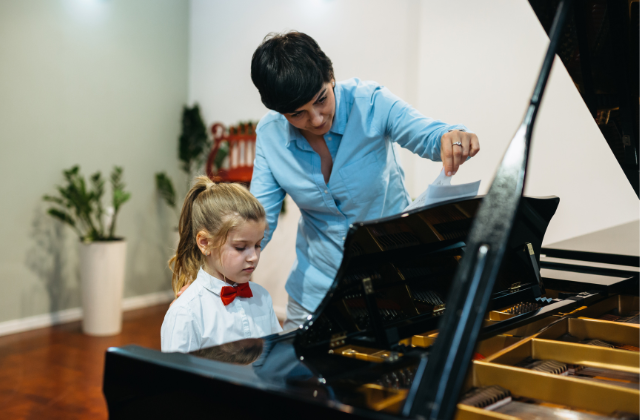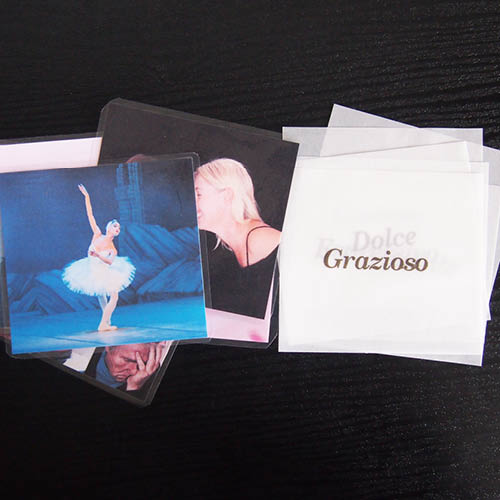
This blog post about how memorising piano music can benefit musicality was written by Yi Lin Tan. Yi Lin is a parent to three children and creator of ‘Parents Can Coach’, which was born out of 10 years (and counting!) of journeying through early childhood and music education with her daughters. Both a resource and community platform, ‘Parents Can Coach’ is where Yi Lin brings her insights and lessons learnt from her family’s music journey to other parents who want to create a nurturing environment for their child to grow.
Memorisation didn’t feature strongly in my childhood music lessons. I brought my sheet music for every piano exam and recital, where I grappled with turning pages and worried about the score falling to the floor mid-performance. 😦

How envious I was of students who played with ease and flair without the aid of a score. It didn’t occur to me to ask my teacher to show me how to play like that.
I just assumed that playing from memory was a special skill available only to the most gifted pianists.
As a parent to piano students, I have since learnt that playing from memory can be an acquired skill if a student is taught memorisation strategies.
And when students can play from memory, they can more readily play with that flair I had always been so jealous of.
How Memorisation Improves Musicality
There needs to be a bigger picture behind spending time and energy to put a piece of music into our head.
That bigger picture is MUSICALITY.
Musicality refers to a person’s sensitivity to and intimate knowledge of the music played. And there are many ways in which memorising music can benefit piano students’ musicality.
Benefit No. 1: Looking Beyond the Score
Learning to play with the score is a good first step in musicality. In addition to reading the notes, students observe other aspects of musical notation such as articulation, dynamics, ornaments and tempo changes in order to sound out each note.
But making music goes beyond simply playing the notes correctly. Students develop sensitivity to music by:
- Feeling the tempo
- Bringing out the dynamics in order to play expressively
- Playing with a beautiful tone
- Playing with expression
And on top of all that, we expect them to enjoy themselves! That’s a lot to demand of students if they are focused on the score as they play (not to mention struggling with page turns).

Memorising the music allows students to push “playing the right notes” to the back of their mind, instead focussing on:
- Listening to themselves
- Observing the composer’s musical direction
- Layering on elements of musicality – tone, dynamics, articulation, tempo and expression
When students are able to connect with every sound, they can start to build an intimate relationship with the music and really internalise it.
Picture how much easier it would be for them to realise these expectations if they didn’t have their eyes glued to the page. 👀
Connecting an expression term to a visual representation of its meaning is a great way to help students bring out the emotion in their pieces. Enter your details below and Nicola will send a sample set of expression mark photo flashcards straight to your inbox.

Subscribe to the newsletter and get the expression Mark Photo Flashcards.
Enter your details to subscribe to the newsletter for piano teachers with information, tips and offers.
I hate spam as much as you do! I will only send you emails related directly to piano teaching and you can unsubscribe at any time.
Members of Vibrant Music Teaching can download the full set of 16 full-size musical expression term photo flashcards from the VMT library. Not a member? You’re missing out on so many resources, wonderfully organised and filterable so you can find just what you need. Take a tour today to learn more.
Benefit No. 2: The Enjoyment of Playing
Another important way memorising piano music can benefit the musicality of a performance is by promoting the sheer enjoyment of the experience.
Imagine that you were having a conversation with someone you know well from having spent a lot of time together. You would likely feel calm and relaxed as you immerse yourself in familiar company.
Even if the situation called for you to express bigger emotion or to fall silent, you would feel comfortable doing so. With a dear friend, you need not feel insecure about behaving correctly because you know that this person would still be here for you.
Overall, it would be an enjoyable experience within a secure relationship.
When a student knows their piece intimately, it becomes like a dear friend. It removes the worry about playing it correctly.
Your student knows they’re in familiar company, and is comfortable fully immersing themselves in the music – whether that’s bringing out an emotional passage or keeping long silences when the piece calls for it. Playing “by heart” frees up a student to play with heart from the heart.

This student can enjoy their musical performance as much as they enjoy spending time with their closest friend.
Benefit No. 3: The Comfort of Confidence
Good memorisation strategies include building in contingencies to rely on, should their memory fail.
For example, many teachers help their students identify “pick-up points” to anchor the piece, and to practise playing the piece mid-way from here. This allows students to be secure in the knowledge that they are equipped to recover from a memory slip.
With this level of comfort, students can play with confidence and let their own personality shine – pushing performance anxiety off the stage.
There’s nothing more enthralling to an audience than watching performers express themselves fully through music.
Memorisation Strategies to Promote Musicality
Just because memorising piano music can benefit the musicality of a performance doesn’t make memorisation any easier.
Memorising music can be gruelling. We shouldn’t memorise a piece simply to make our brain remember stuff, or because it would be cool to play a piece on demand.
Undoubtedly, memorisation requires hard work – but it doesn’t need to be all pain and no fun.
As a practice parent, I support my children when working on their weekly piano assignments – and sometimes, this includes having to memorise a piece or sections of it.
Here are 3 strategies we use in our house to make memorisation fun and promote musicality.
Strategy No. 1: Binge Listening
Try to build in a habit of daily listening.
Listening on repeat pre-loads the music into our brains, making it easier to anticipate and hear a note in our mind before our finger plays it.

In addition, hearing a piece played by professional musicians gives students a chance to discern the nuances of expression, tempo and articulation.
You can even make a quiz out of a listening task. For example, you could ask, “How many times does the same phrase appear in this piece?” or “Does the music end softly or loudly?”
Games like ’Inquisitive Ears’, ‘Listen Loud’, and ’This That Other T’other’ from the VMT Library also help students to exercise their listening muscles while having fun at the same time.
Not a member of Vibrant Music Teaching? Take a tour to discover how much easier and more fulfilling the membership can make your teaching life.
Strategy No. 2: Handy Tools
My daughters and I like to place visual aids within easy reach for when memorising becomes a challenge. Suggestions include:
- Beads for tracking repetitions
- A mini whiteboard and markers for doodling a story to help students remember what comes next, and to encourage artistic playing
- ’Mount Memory’, a fun game from the VMT Library to help students test their memorisation
Still not convinced about becoming a VMT member? Take a tour to see how the membership does so much of your teaching work for you!
Strategy No. 3: The “3 Ss”
Have a strategy to break down memorising into smaller tasks. Our favourite is the “3 Ss”, which stand for “Sections, Slow, Separate Hands”.
- Practise short sections of the piece, paying attention to the musicality as you play
- Try using a slower tempo
- Start by playing the left- and right-hand parts separately
When students are able to master chunks of music in this way, they imbed the marks of musicality (dynamics, articulation, tempo and other expressive qualities) into their memory.
Need more memorisation strategies? Check out the Colourful Keys “Teaching Piano Practice” hub page for the latest and greatest in tips, tricks and resources.

Does memorisation help YOU focus more on musicality?
Share your experience and tips with us in the comments below.
Really loved the suggestions. Thank you.
We’re so glad you found it helpful, Glenda!